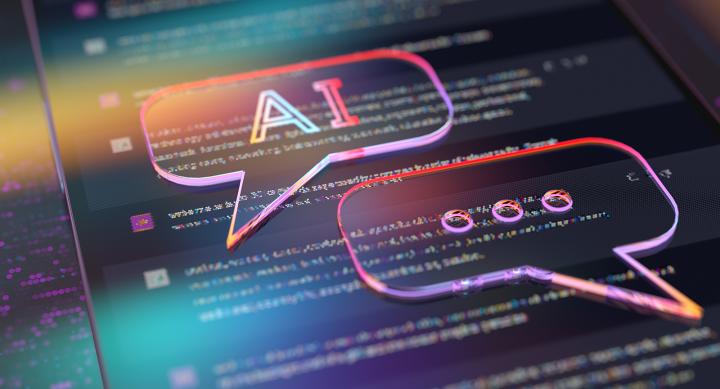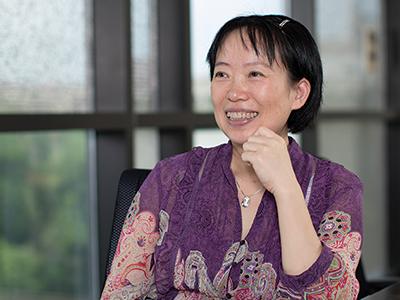
The integration of artificial intelligence (AI) into health care has revolutionized the industry, offering innovative solutions to complex challenges. Among the various domains within health care, nursing stands at the forefront of this transformation, harnessing AI to enhance patient care, optimize workflows and improve outcomes.
Researchers, such as Bo Xie, PhD, FGSA, professor at the School of Nursing, are turning to innovative solutions, such as AI to provide tailored support and services to caregivers. Xie and her interdisciplinary research team are harnessing the power of AI to address the information wants of caregivers for persons living with Alzheimer’s disease and related dementias (ADRD). Xie said her research, for over 20 years, has focused on examining the intersection of aging, health and information technology.
“AI is changing everything we know of as we speak, and the rate will only increase from here on,” Xie said. “Scary but at the same time exciting. AI will become part of the infrastructure, much like electricity or running water, before we know it. It will change nursing practice, education and research, whether or not we like it. We can’t stop it; the best we can do is to get into the game, and early on, to hopefully play a role in shaping its direction.” - Bo Xie
The challenges of caregiving
ADRD presents a significant public health challenge, with caregivers often bearing the weight of providing extensive daily care. People with ADRD are usually cared for by family members or friends, with 80 percent of people with ADRD receiving care in their homes.
According to the Centers for Disease Control and Prevention, every year, more than 16 million Americans provide more than 17 billion hours of unpaid care for family and friends with ADRD, highlighting the immense burden placed on families and communities. However, caregivers frequently struggle to access sufficient information and support to navigate the challenges of caregiving.

Xie’s research project, “Tailoring Responses to ADRD Caregivers’ Information Wants Through Human-Machine Collaboration (TRACO),” received a $561,417 grant from the National Institute on Aging of the National Institutes of Health.
She is conducting this interdisciplinary research with Daqing He, PhD, professor in the Department of Informatics and Networked Systems at the University of Pittsburgh’s School of Computing and Information. Co-investigators on the project include Robin Hilsabeck, PhD, ABPP, director of the Comprehensive Memory Center in the Mulva Clinic for the Neurosciences at Dell Medical School, and Alyssa Aguirre, LCSW-S, assistant director of Dementia Care Transformation for the Department of Neurology at Dell Medical School and assistant professor of practice at UT Austin Steve Hicks School of Social Work.
This high-priority research project seeks to bridge the gap in caregiving support by leveraging human-machine collaboration to deliver personalized information and services to caregivers.
Creating a knowledge base
The TRACO project is grounded in interdisciplinary collaboration, drawing on expertise in nursing, informatics and social work to address the multifaceted needs of ADRD caregivers. The research team aims to develop a comprehensive knowledge base informed by insights from caregivers themselves, obtained through the analysis of social media posts and existing information resources.
This knowledge base will serve as the foundation for a tailoring engine, capable of delivering tailored responses to caregivers based on their unique characteristics, caregiving scenarios and information preferences.
The TRACO system will be implemented as a mobile application interface, ensuring accessibility and usability for caregivers in their daily lives.
TRACO exemplifies the transformative potential of AI in addressing the unmet needs of ADRD caregivers. By harnessing the power of human-machine collaboration, TRACO seeks to revolutionize caregiving support, providing personalized information and services to caregivers when and where they need it most.
As we navigate the challenges posed by ADRD, innovative solutions such as TRACO offer hope for a future where caregivers receive the support and recognition they deserve.
The demands of caregiving can limit a caregiver’s ability to take care of themselves. Family caregivers of people with ADRD are at greater risk for anxiety, depression and poorer quality of life than caregivers of people with other conditions.
Meaningful support
The potential impact of the TRACO project is profound, offering a transformative approach to supporting ADRD caregivers in their vital role. Caregivers often face overwhelming challenges, from managing complex medical needs to navigating emotional and practical concerns.
By providing personalized information and support tailored to the diverse needs of caregivers, TRACO aims to empower caregivers with the knowledge and resources necessary to address these challenges more effectively.
One of the key strengths of TRACO lies in its ability to deliver tailored responses that resonate with caregivers on a personal level. By drawing insights from caregivers themselves, through the analysis of social media posts and existing information resources, TRACO ensures that the support it offers is relevant and meaningful.
Whether caregivers are seeking guidance on medication management, strategies for coping with behavioral symptoms, or resources for respite care, TRACO can provide targeted assistance that aligns with their unique circumstances and preferences.
By leveraging AI and digital technology, TRACO has the potential to reach caregivers on a large scale, transcending geographical barriers and enabling widespread access to support services.
Caregivers often face logistical challenges in accessing traditional support resources, such as attending in-person support groups or consulting with healthcare professionals.

TRACO’s mobile application interface ensures that caregivers can access support whenever and wherever they need it, whether they are at home, at work or on the go. This accessibility is particularly crucial for caregivers from underserved communities, who may face additional barriers to accessing support services.
In addition to enhancing the quality of care and reducing caregivers’ stress, TRACO has the potential to foster a sense of community and solidarity among caregivers.
Caregiving can be isolating, with caregivers often feeling overwhelmed and disconnected from others who share similar experiences. TRACO’s digital platform provides a space for caregivers to connect, share stories and offer support.
TRACO helps caregivers feel less alone in their journey, strengthening their resilience and well-being.
Xie’s TRACO research represents a promising step forward in supporting ADRD caregivers and addressing the unmet needs of this vulnerable population.
By combining the power of AI with insights from caregivers themselves, TRACO offers a personalized and accessible approach to caregiving support, paving the way for a future where caregivers receive the recognition, resources and assistance they deserve.

